All Management Events
- Find your place behind the screen July 7, 2022
No form of art goes beyond ordinary consciousness as film does, straight to our emotions, deep into the twilight room of the soul
– Ingmar Bergman
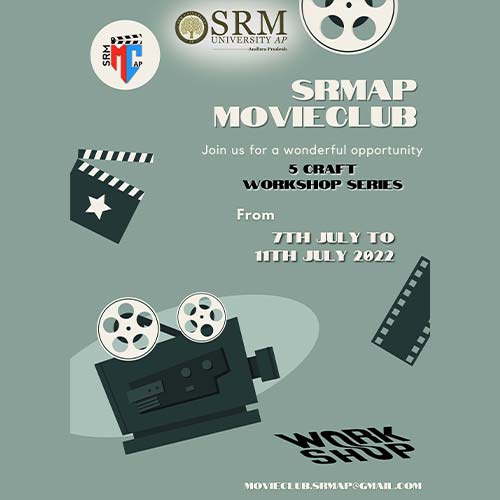 Inside the dark space of a movie theatre, it’s just us, the screen, and the projecting light against the world. We join the revolt of the artist against the real. The very idea of perceiving the comfort and discomfort of a cinema while sitting with a bunch of unfamiliar faces is enough to make you fall into the rabbit hole of filmmaking.
Inside the dark space of a movie theatre, it’s just us, the screen, and the projecting light against the world. We join the revolt of the artist against the real. The very idea of perceiving the comfort and discomfort of a cinema while sitting with a bunch of unfamiliar faces is enough to make you fall into the rabbit hole of filmmaking.Ever wondered how people connect with people through mere moving images? Ever think of the stories you want to tell but cannot fix frames and pour life into them? It is the filmmaking enthusiast in you who makes you think of what is in a frame and what is out.
The fascinating thing about cinema is that it is an endless tool made up of pretty much the same elements. Cinema uses the language of dreams and each of them is entirely different from the other. The Movie Club is ready with a filmmaking workshop to awaken the storyteller in you. The workshop offers an intensive and instructional five-day programme focusing on the five main agents of cinema, including Scriptwriting, Direction, Photography, Editing, and Acting.
Date: From July 7 to July 11, 2022
Time: 6 PM
With every good film you see, you feel reborn
Join the workshop and find your place behind the screen!
Continue reading → - SRM AP to take part in Akhil Bharatiya Shiksha Samagam July 6, 2022
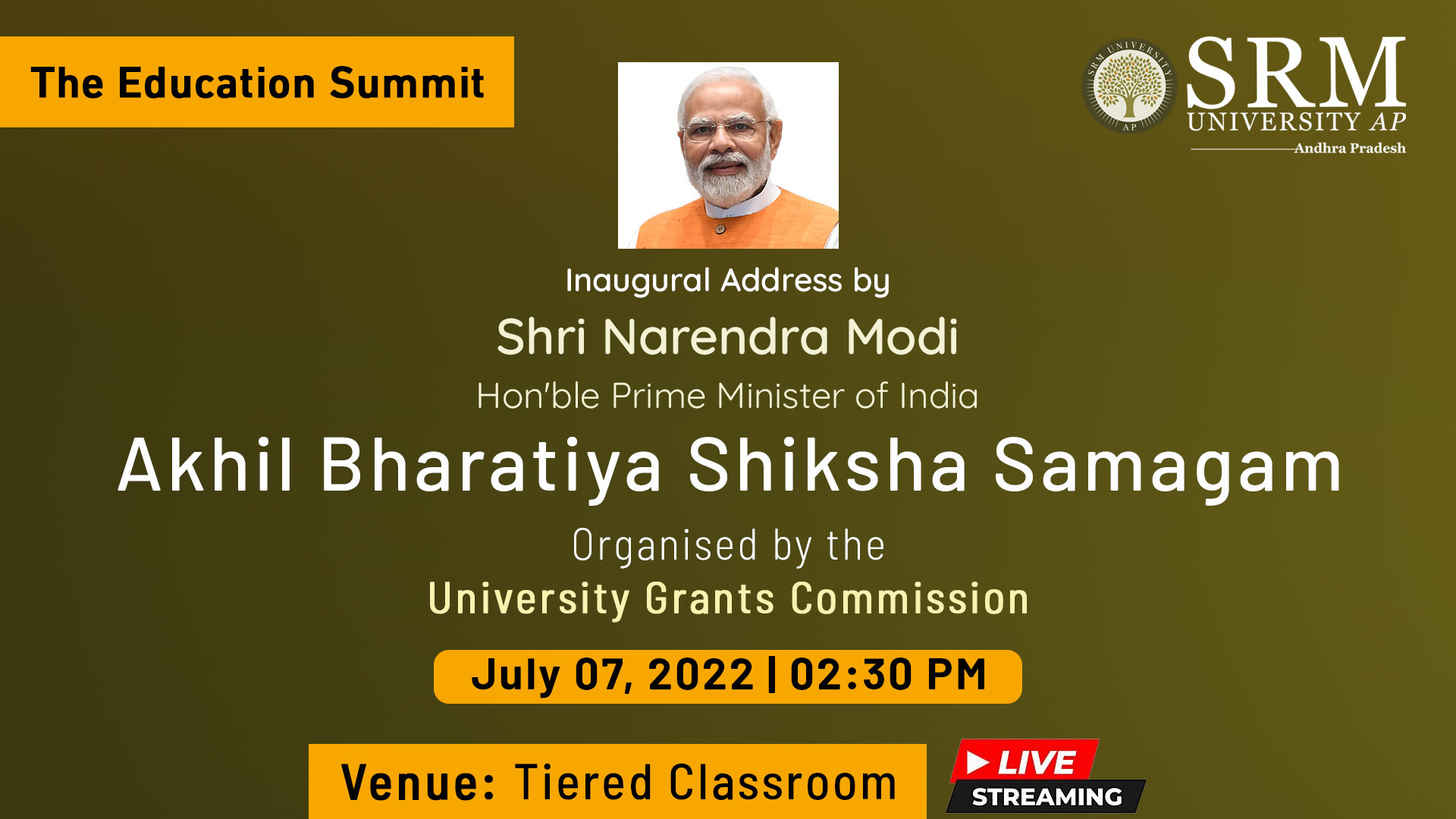 The higher education regulatory body, University Grants Commission (UGC) is organising a three-day education summit, Akhil Bharatiya Shiksha Samagam , at Varanasi, Uttar Pradesh, from July 7 to July 9, 2022. The Hon’ble Prime Minister of India, Shri Narendra Modi will grace the occasion by delivering the inaugural address. SRM university-AP is being part of the summit by live-streaming the inaugural event on campus.
The higher education regulatory body, University Grants Commission (UGC) is organising a three-day education summit, Akhil Bharatiya Shiksha Samagam , at Varanasi, Uttar Pradesh, from July 7 to July 9, 2022. The Hon’ble Prime Minister of India, Shri Narendra Modi will grace the occasion by delivering the inaugural address. SRM university-AP is being part of the summit by live-streaming the inaugural event on campus.Academicians, researchers, policymakers, professional and educational experts, and industry experts from all over the country will gather at the summit to discuss the diverse perspectives of the National Education Policy 2020 and its role in transforming higher education. The workshop intends to analyse the impact of the education policy after the successful implementation of several initiatives in the past two years. The summit will involve thought-provoking conversations on articulating action plans, implementation strategies, multidisciplinary and holistic education, skill development and employability, Indian knowledge systems, etc. It will also consider the challenges being faced by educational institutes and articulate solutions.
Date: July 07, 2022
Time: 2.30 pm
Venue: Tiered classroom Level- V, Admin Block
Join the live telecast of the inaugural address!
Continue reading → - Yesterday you said tomorrow! July 6, 2022
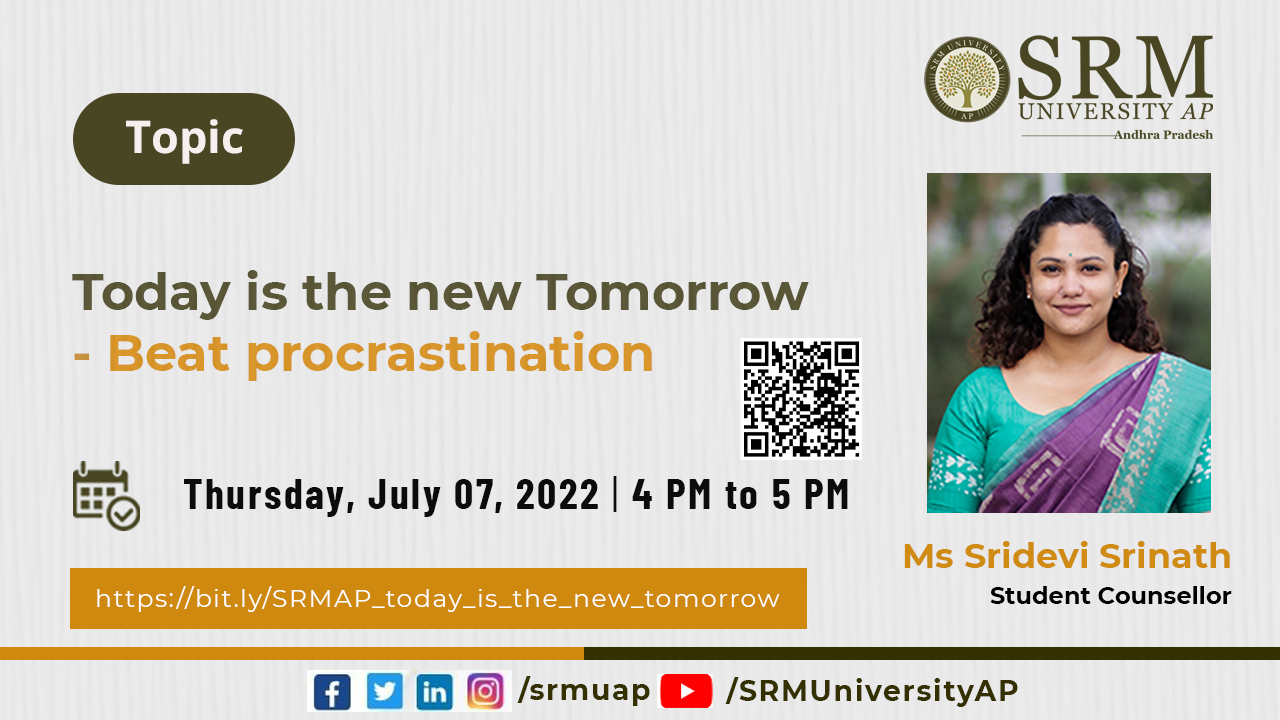 Procrastination is irrational and existential at its core. The ambiguous nature of self-awareness makes us feel rotten and glad at the same time while putting things off for a moment. It is a coping mechanism to resist the challenging emotions caused by the sight of certain tasks. That’s why procrastination is never an issue of time management but emotion regulation. It becomes a habit and not a once-in-a-blue-moon phenomenon.
Procrastination is irrational and existential at its core. The ambiguous nature of self-awareness makes us feel rotten and glad at the same time while putting things off for a moment. It is a coping mechanism to resist the challenging emotions caused by the sight of certain tasks. That’s why procrastination is never an issue of time management but emotion regulation. It becomes a habit and not a once-in-a-blue-moon phenomenon.The Department of Student Affairs is coming up with a talk on Today is the new Tomorrow – Beat procrastination, which will be handled by Student Counsellor Ms Sridevi Srinath. It’s time to break the ties between procrastination and productivity. It has nothing to do with the effectiveness of productive effort but with managing emotions. This session will help you break the procrastination cycle and develop an action plan that works for you.
Date: July 07, 2022
Time: 4 pm to 5 pm
About the speaker
Ms Sridevi Srinath has been in the field of counselling for over eight years. She holds an MSc in Counselling Psychology from Madras School of Social Work and an MPhil in Psychology from the University of Madras. Working in a school previously, she has over five years of experience in impacting the lives of children and adults across issues such as anxiety, stress, behavioural changes, soft and life skills, and career guidance, to name a few. She also has certification from UCLA Extension in Career Guidance and Counselling.
Come, and join the session!
Let tomorrow be a fallacy; start getting your stuff done today
Continue reading → - Towards deep learning algorithms for space exploration July 5, 2022
Rohan Reddy Sambidi received admission offers with scholarships upto $16,500
 Rohan Reddy Sambidi from Btech CSE at SRM University-AP is delighted to have received admission offers from numerous universities abroad. He secured admission to MS in Computer Science at Purdue University, Fort Wayne; Texas A&M University, College Station (Distance); Arizona State University, Tempe; Illinois Institute of Technology, Chicago; University of South Florida, Tampa; and the University of Houston. Along with this, he received an offer from the University of Maryland, College Park for the Master of Professional Studies in Machine Learning programme. Admission offers came with a scholarship of $10,000 from ASU and $16,500 from IIT Chicago.
Rohan Reddy Sambidi from Btech CSE at SRM University-AP is delighted to have received admission offers from numerous universities abroad. He secured admission to MS in Computer Science at Purdue University, Fort Wayne; Texas A&M University, College Station (Distance); Arizona State University, Tempe; Illinois Institute of Technology, Chicago; University of South Florida, Tampa; and the University of Houston. Along with this, he received an offer from the University of Maryland, College Park for the Master of Professional Studies in Machine Learning programme. Admission offers came with a scholarship of $10,000 from ASU and $16,500 from IIT Chicago.The suitable choice
Rohan has decided to join the MS in Computer Science programme at Arizona State University. He plans to prepare a thesis and focus his research on the field of machine learning. He wants to explore and address the challenges of designing efficient deep learning algorithms for space exploration through telescopic imagery. He is also interested in doing a few courses on theoretical computer science.
Finding the best
For selecting universities, Rohan started by acquiring a list of reputed universities from the QS Rankings website. Then he shortlisted universities by focusing on the course curriculum, faculty, and resources for student research. He has completed his bachelor’s degree at SRM university-AP with a major in Computer Science and Engineering and a minor in Physics.
Support from SRM AP
The mentorship of accomplished faculty has helped Rohan build strong foundational knowledge in his discipline. Through the course projects, UROP, and the Capstone Project, he has developed research skills and built a compelling profile essential for admission to leading universities in the USA. He expressed his gratitude to his professors and mentors, Prof Dr Ragunathan T, Dr Jatindra Kumar Dash, and Dr Murali Krishna Enduri, for their relentless guidance. He is immensely grateful for the opportunities that he received from SRM university-AP.
Continue reading → - Reverse carry select adder and graphene-based field-effect transistor July 5, 2022
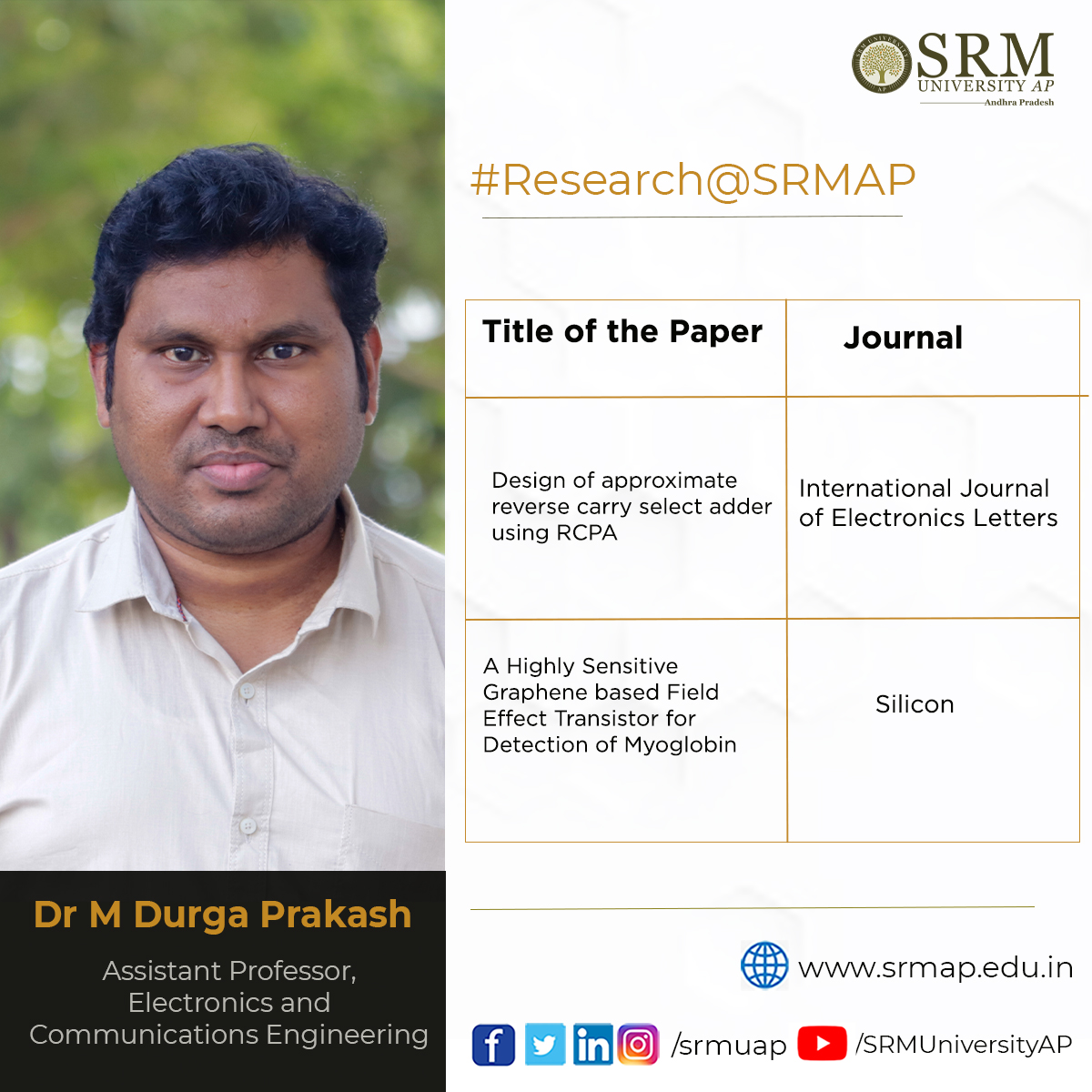 By publishing two papers in well-acclaimed research journals, Assistant Professor Dr M Durga Prakash of the Department of Electronics and Communication Engineering is expanding the possibilities of his research domain through innovative ideas. The first paper was published in the International Journal of Electronics Letters, an internationally renowned peer-reviewed rapid communication journal. It is titled Design of approximate reverse carry select adder using RCPA and has an impact factor of 1.5.
By publishing two papers in well-acclaimed research journals, Assistant Professor Dr M Durga Prakash of the Department of Electronics and Communication Engineering is expanding the possibilities of his research domain through innovative ideas. The first paper was published in the International Journal of Electronics Letters, an internationally renowned peer-reviewed rapid communication journal. It is titled Design of approximate reverse carry select adder using RCPA and has an impact factor of 1.5.Abstract
An approximate carry select adder (CSLA) with reverse carry propagation (RCSLA) is shown in this work. This RCSLA was designed with a reverse carry propagate full adder (RCPFA). In the RCPFA structure, the carry signal propagates in the reverse direction, that is, from MSB part to LSB part, then the carry input has greater importance compared to the output carry. Three types of implementations were designed in RCPFA based on the design parameters. This method was applied to RCA & CSLA to design other types of approximate adders. These designs and simulations were done in CADENCE Software tool with 45 nm COMS technology. The design parameters of the three CSLA implementations with RCPFA are compared with the existing CSLA adders.
The other paper, A highly sensitive graphene-based field-effect transistor for detection of myoglobin, has been published in the Silicon Journal, an international and interdisciplinary journal, with an impact factor of 2.67.
Abstract
Biomedical applications adapt Nanotechnology-based transistors as a key component in the biosensors for diagnosing life-threatening diseases like Covid-19, Acute Myocardial Infarction (AMI), etc. The proposed work introduces a new biosensor, based on the Graphene Field Effect Transistor (GFET), which is used in the diagnosis of Myoglobin (Mb) in human blood. Graphene-based biosensors are faster, more precise, stronger, and more trustworthy. A GFET is created in this study for the detection of myoglobin biomarker at various low concentrations. Because graphene is sensitive to a variety of biomarker materials, it can be employed as a gate material. When constructed Graphene FET is applied to myoglobin antigens, it has a significant response. The detection level for myoglobin is roughly 30 fg/ml, which is quite high. The electrical behaviour of the GFET-based biosensor in detecting myoglobin marker is ideal for Lab-on-Chip platforms and Cardiac Point-of-Care Diagnosis.
Continue reading → - 100% Erasmus Mundus Scholarship and MS opportunities in Europe July 5, 2022
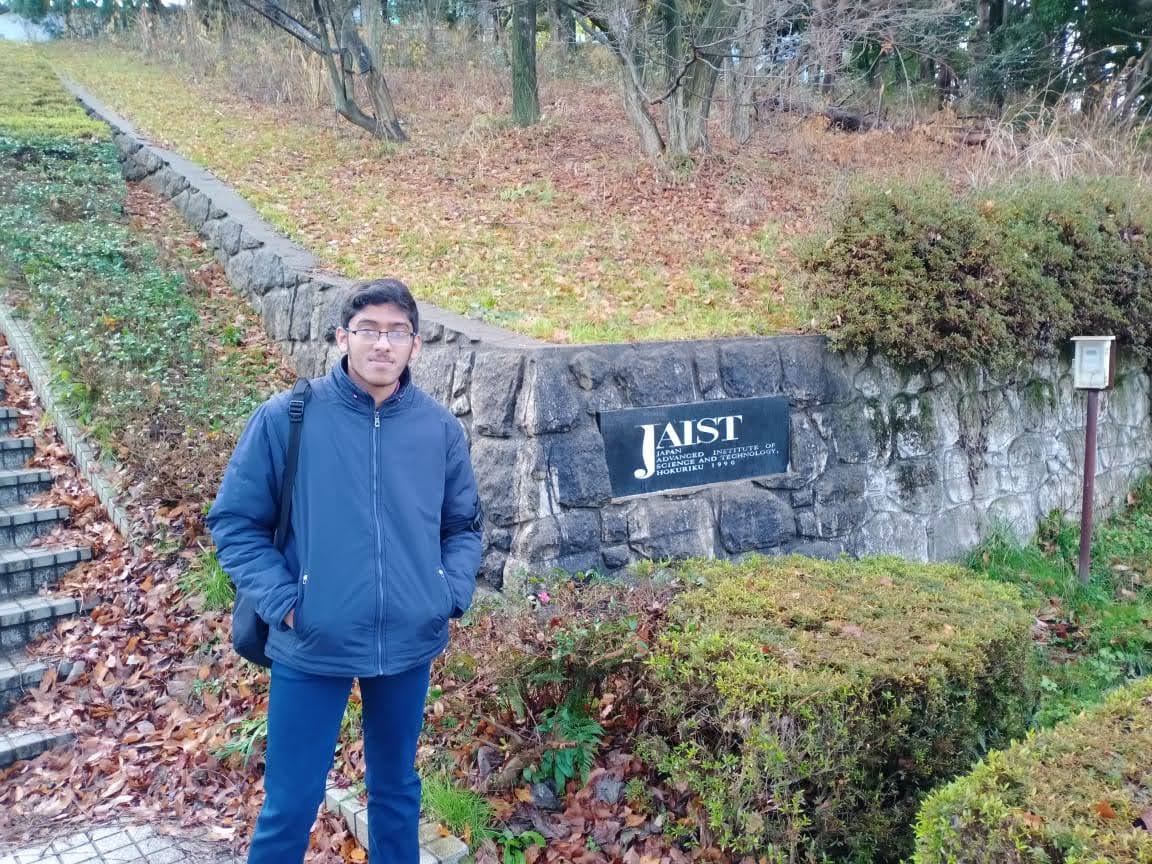 SRM University-AP has numerous success stories and student accomplishments to share with the world. What makes the story of Bennet Benny different is the magnitude of his winning and the miles he has crossed after setting foot to achieve his dreams. He has secured the much-coveted Erasmus Mundus Joint Masters Scholarship with a whopping sum of € 33,600 for two years. With the 100% EMJM scholarship, he can now pursue QuanTEEM Master’s across four different universities, each semester in one of these universities:
SRM University-AP has numerous success stories and student accomplishments to share with the world. What makes the story of Bennet Benny different is the magnitude of his winning and the miles he has crossed after setting foot to achieve his dreams. He has secured the much-coveted Erasmus Mundus Joint Masters Scholarship with a whopping sum of € 33,600 for two years. With the 100% EMJM scholarship, he can now pursue QuanTEEM Master’s across four different universities, each semester in one of these universities:University Bourgogne Franche-Comté (France)
Technische Universität Kaiserslautern (Germany)
Aarhus University (Denmark)
Moskovskiy Fiziko-Tekhnicheskiy Institut (Russia)Internship at JAIST, Japan -2019
Like every other student, Bennet joined the Bachelor’s degree programme at the Department of Physics in 2018 with an irrepressible desire to dive into the depths of Physics. His undying passion for grasping the subject’s nuances is an influential lesson for all students to emulate. When he was in the second year of his graduate studies, Bennet won the Sakura Science Internship under the supervision of Prof. Ryo Maezono at JAIST, Japan. The internship was funded by the Japan Science and Technology Agency (JST), a government funding agency. For him, this was an excellent opportunity to learn more deeply about quantum mechanics. It also helped him raise his awareness of computational physics, its advantages, uses and the latest research around it.
“I was able to interact with many international scholars and researchers at the Japan Advanced Institute of Science and Technology. It helped me learn about the various ways through which I could fund my higher education. Therefore, after returning to SRM University-AP, I could work in the necessary direction to build my profile accordingly.” Bennet remarked. The enormous lessons he learned there helped him publish a research paper under the guidance of Prof Ranjit Thapa and his PhD students in the Computational Physics laboratory. “The Department of Physics has always motivated me to reach greater heights”, he added.
NTU-India Connect Research Programme 2022
Bennet has also proved his mettle by securing yet another internship opportunity as part of the NTU-India Connect Research Programme 2022. He was selected to spend a semester (Spring term) at NTU, Singapore with a full fellowship during the final year of graduation. As a young researcher, he has gained immense exposure and experience in such a short period giving him a competitive edge to move further in the direction of his dreams. “It has always been my dream to pursue a research career in Physics”, he asserted.
Looking Forward to QuanTEEM Master’s
The QuanTEEM Master’s programme is based on Quantum technologies and provides an excellent opportunity to build a research network in multiple countries in the European Union. He aspires to gain a deeper understanding of quantum mechanics and wishes to use the knowledge to improve our civilisation. In the words of Bennet, “We should never let the fear of failure deter us from trying. I feel that to reach our best potential; we need to face the challenges in life rather than be disheartened by them. Hence, I would encourage my fellow students never to hesitate to seek new opportunities.”
Continue reading → - SRM AP Conducts Blood Donation Camp July 4, 2022
The-Hindu – June 21
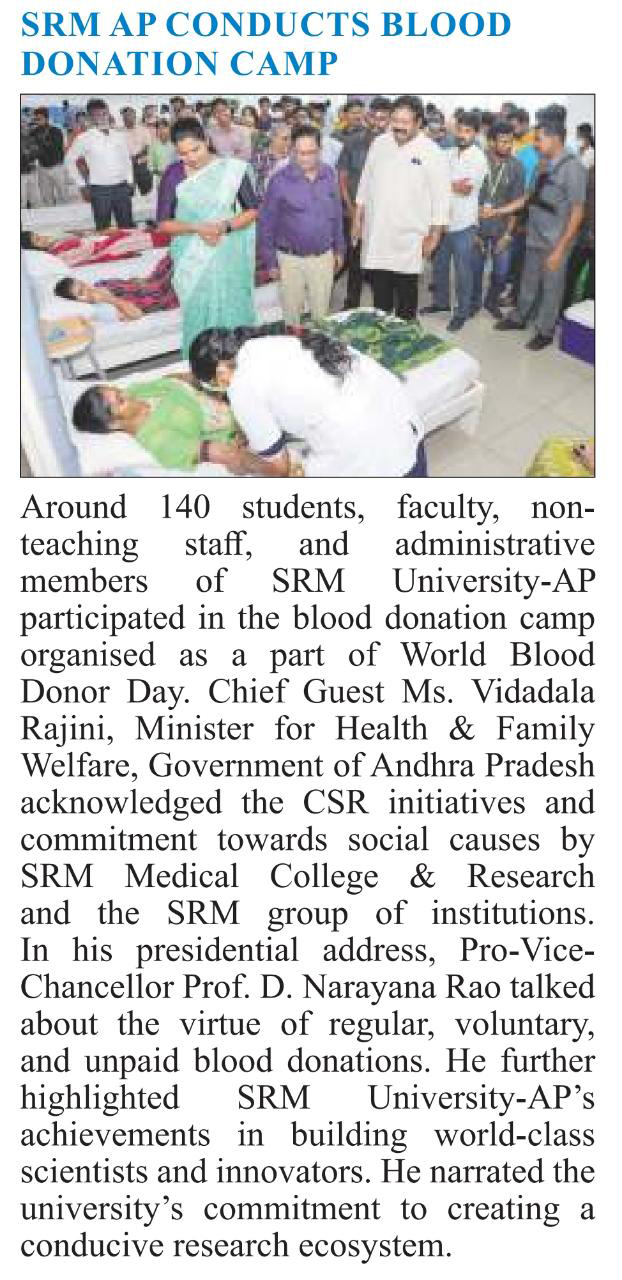
Financial-Expresss – June 17
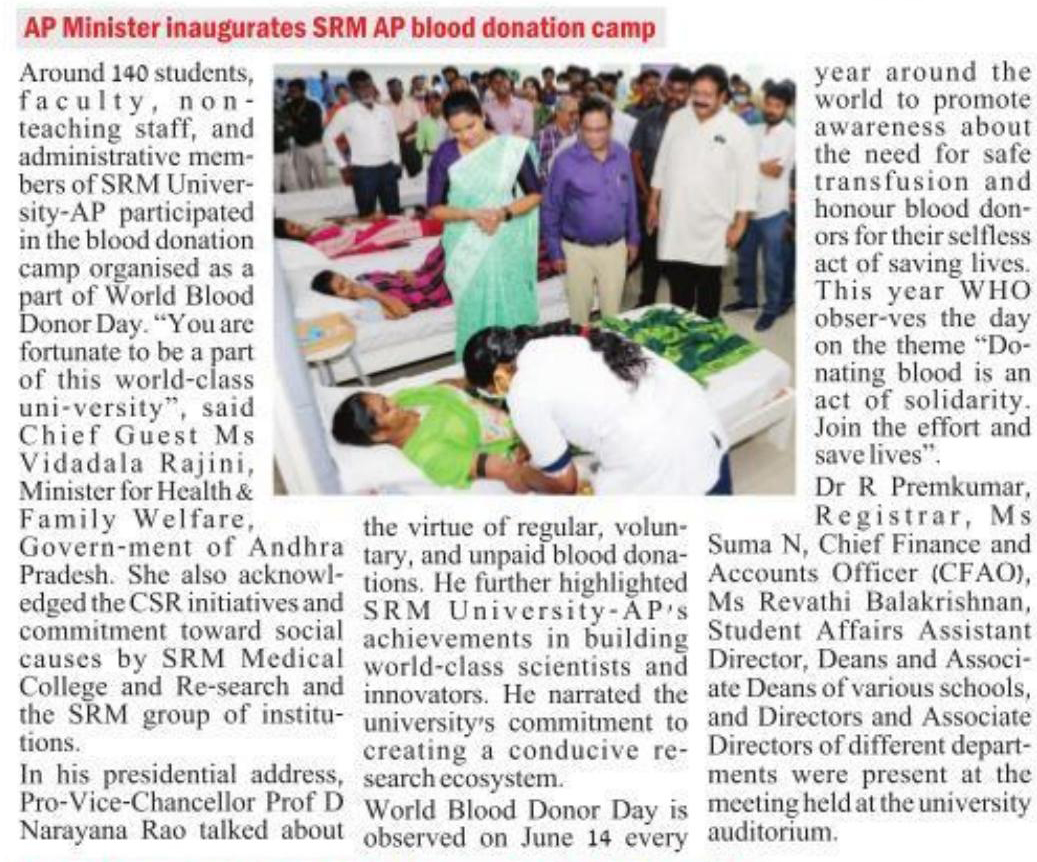
The-Hindu – June 16
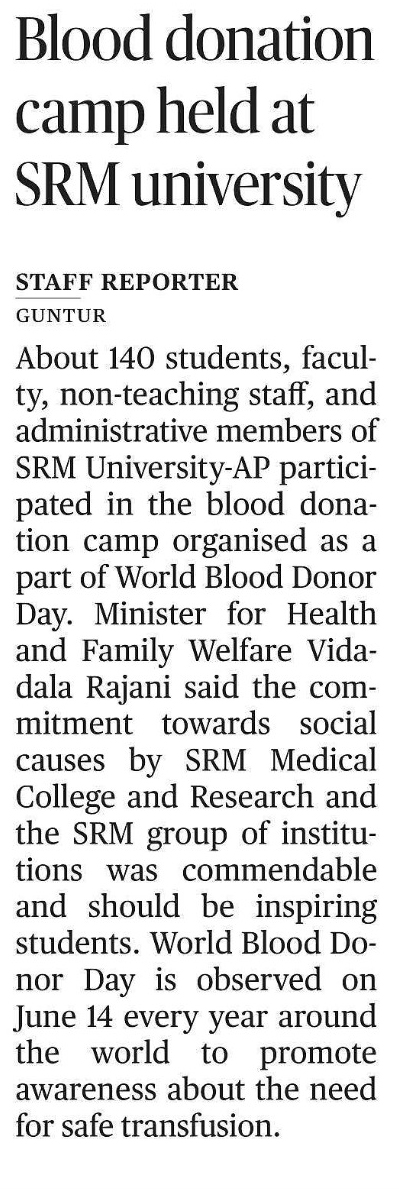
New-Indian-Express – June 15
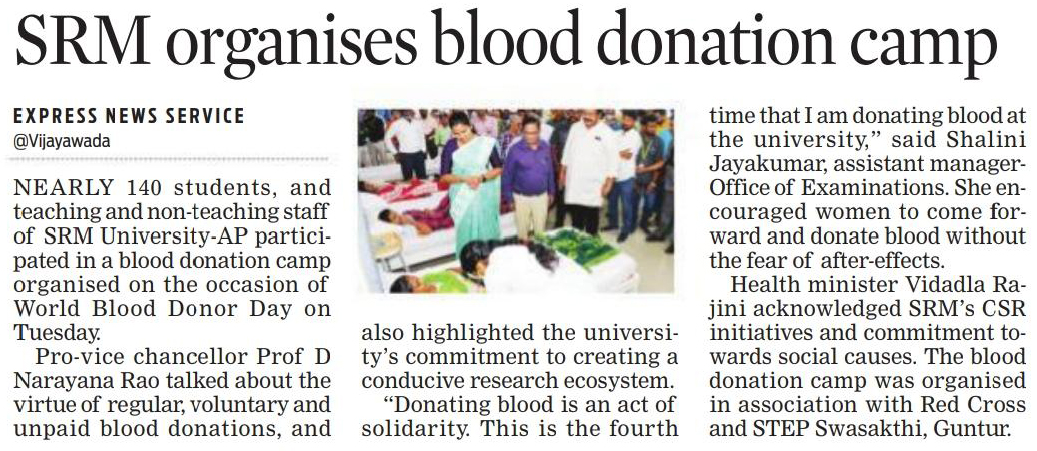
Deccan-Chronicle – June 15
Continue reading →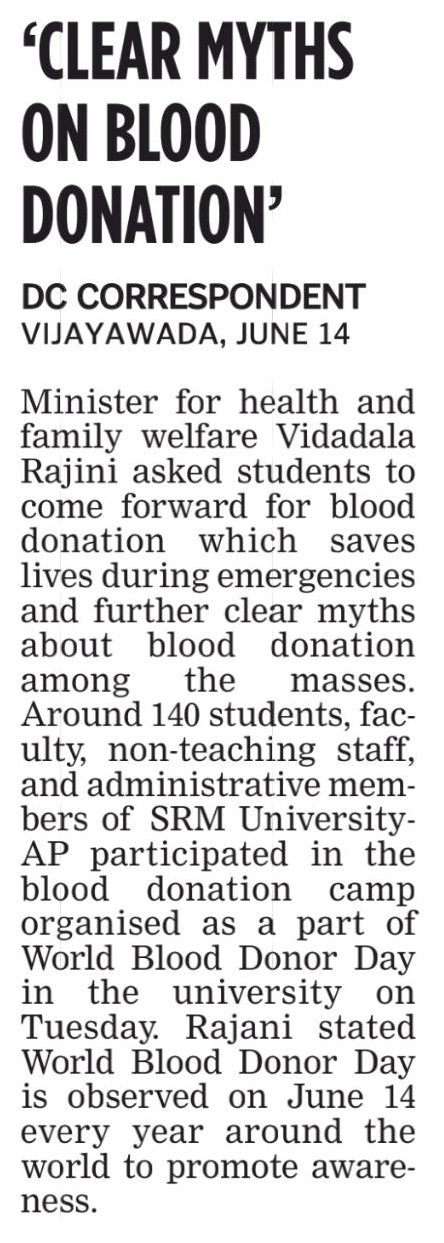
- Dr Koyel Chakravarty July 4, 2022
- SRMAP B tech Entrance Test on June 12 July 4, 2022
Chronicle – June 09
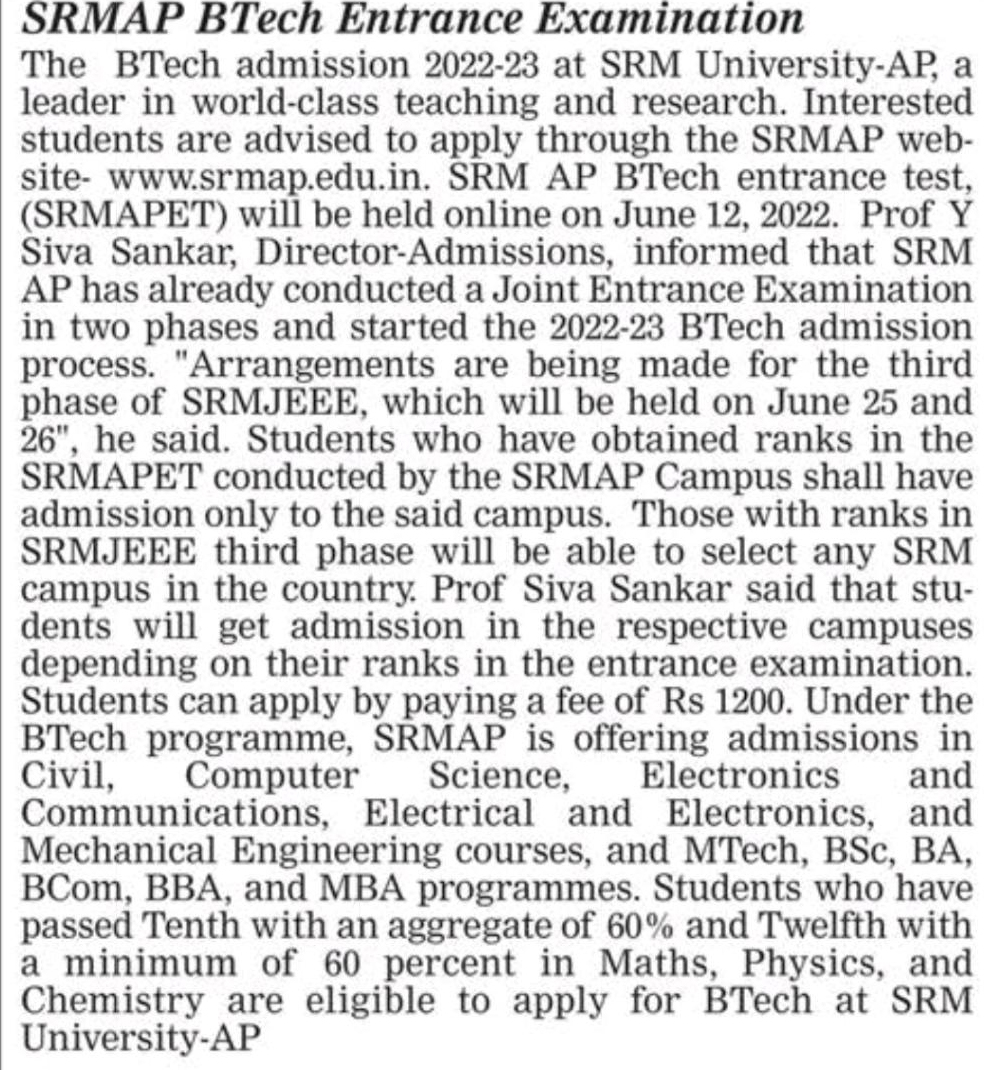
Daily-Kesari – June 08
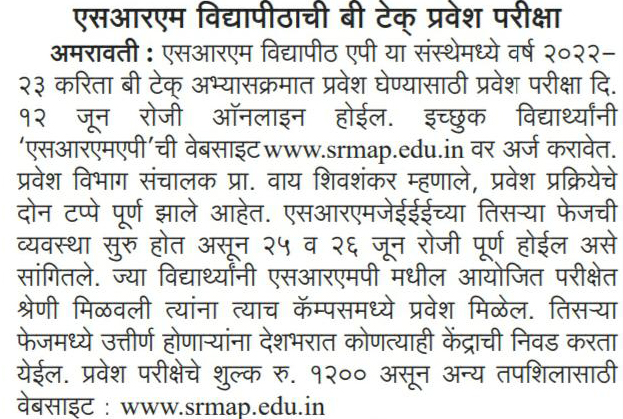
New-Indian-Express – June 06
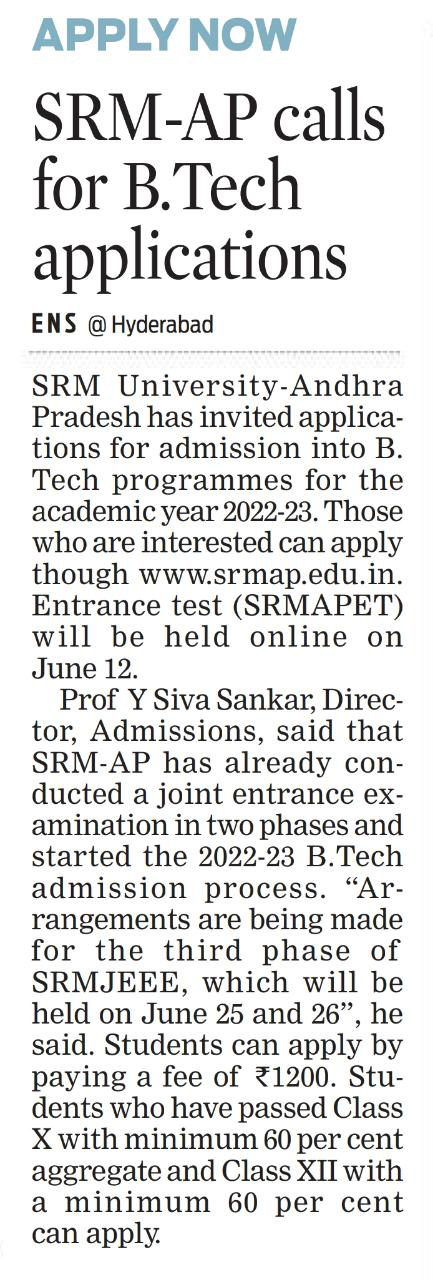
The-Hindu – June 05
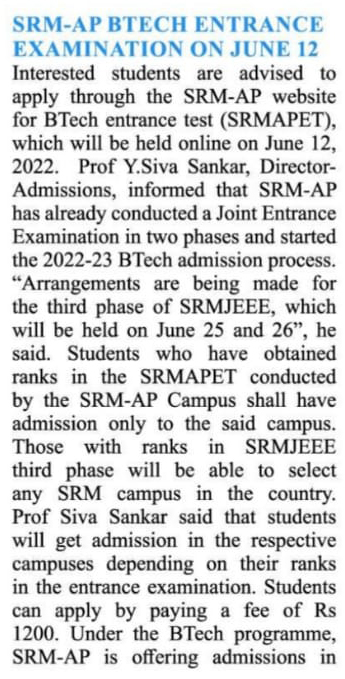
Hans-India – June 04
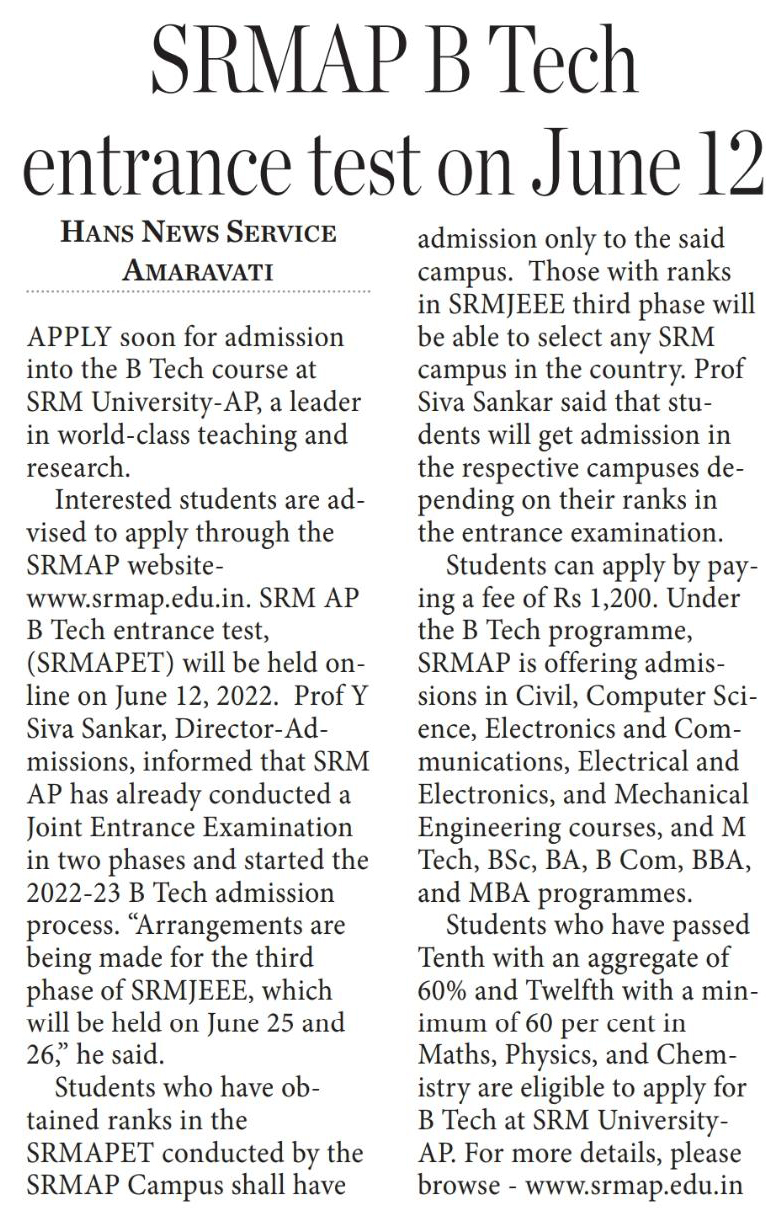
Sakshi – June 04
Continue reading →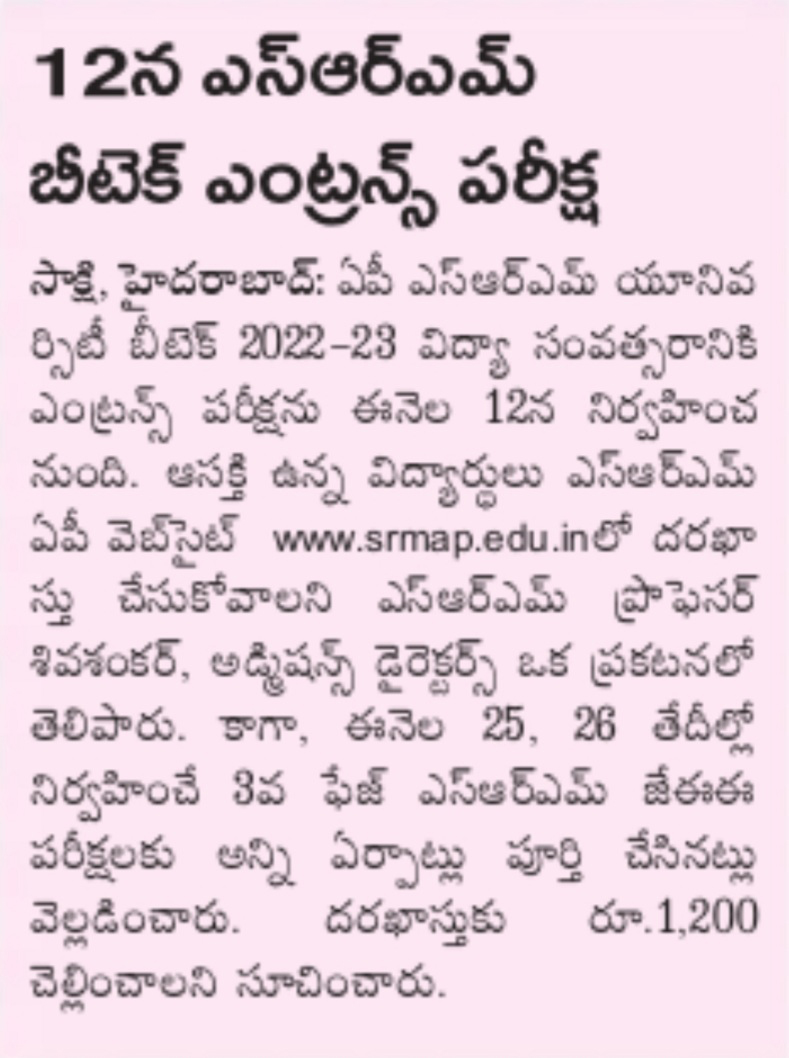
- Dr Pankaj Pathak published articles on sustainable waste management July 2, 2022
Dr Pankaj Pathak from the Department of Environmental Science has been keenly involved in research studies involving solid waste management and the effective conversion of wastes to energy. Her latest research publication ‘A comprehensive review on integrative approach for sustainable management of plastic waste and its associated externalities’ in the journal Science of the Total Environment (Impact Factor: 10.973) proposes enhanced solution for the sustainable management of plastic wastes. The article was published in collaboration with her PhD Scholar MSSR Tejaswini, Prof Sreeram Ramakrishna from the Centre for Nanofibers and Nanotechnology, National University of Singapore and Dr P Sankar Ganesh from BITS Pilani, Hyderabad.
Abstract of the Research
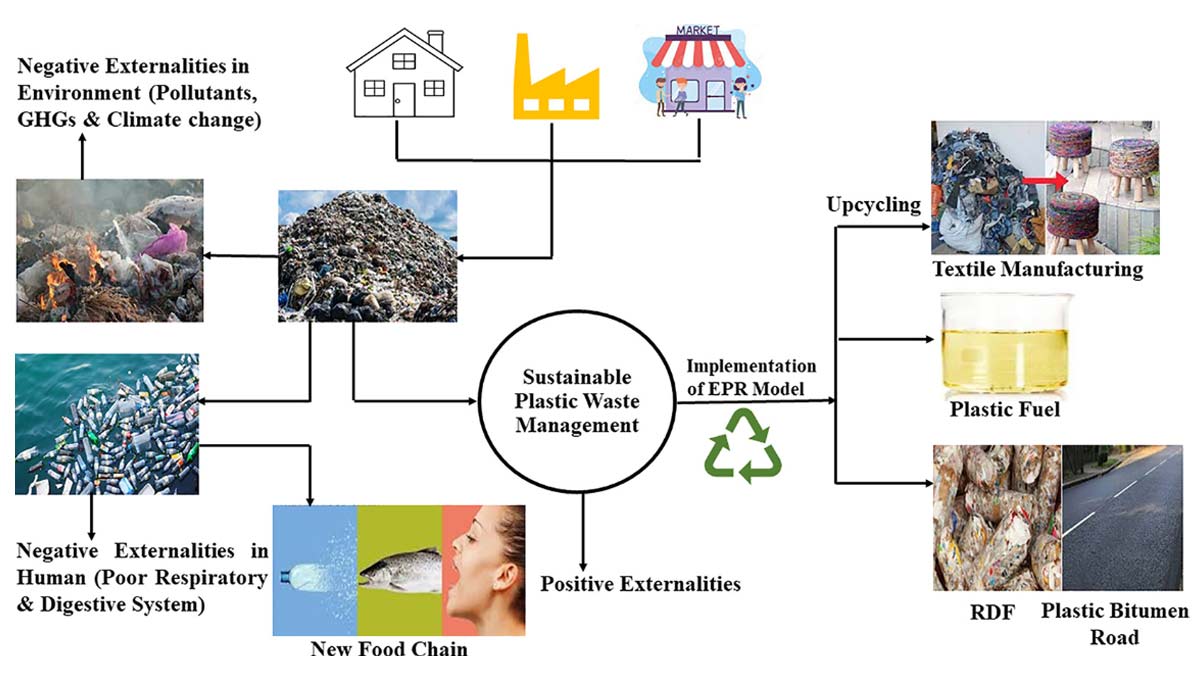
The management of post-consumer discarded plastic wastes (PCPW) creates new challenges in developing countries due to the lack of amenities, technological interventions, and associated negative environmental externalities. The fate of untreated recyclable and non-recyclable plastic wastes lies in open dumping along with other solid waste, and improper management leads to environmental externalities such as pollution, global climate change, and health issues. Additionally, open dumping upsurges the emerging microplastics and nano plastics (MNPs) contaminants. The externalities depend on the waste generating sources (household, industries, commercial), waste composition, and its characteristics. However, urban mining can minimize environmental externalities where waste plastics can convert into potential anthropogenic resources and also helps in achieving the target of sustainable development goals (SDGs 11 & 12). Moreover, various treatment technologies that help in the sustainable utilization of plastic wastes are extensively reviewed in this study and evaluate the costs benefits arising during various stages of treating plastic waste through recycling (R), incineration (I), and landfilling (L). The recycling of plastic waste has demonstrated the lowest impact on global warming potential (GWP) and total energy use (TEU), followed by landfilling and incineration (R < L < I). Nevertheless, when energy is recovered from inert (non-recyclable) plastic waste in the form of fuel or by its utilization in construction purposes, the environmental impacts are more negligible (Incineration < Landfilling). Therefore, this study determines the significance of circular economy with legislative approach and standards on plastic waste management, which help in reducing environmental externalities besides yielding a secondary resource as energy and materials through urban mining. A sustainable plastic waste management (SPWM) model is proposed for developing countries to convert plastic waste into resources and use it as a sustainable tool in urban mining.
Yet another article, ‘Comprehensive technological assessment for different treatment methods of leather tannery wastewater’, co- published by Dr Pankaj Pathak along with a group of other researchers was featured in the journal Environmental Science and Pollution Research having an Impact Factor of 5.19. The work offers some exhaustive observations and recommendations that could be helpful in the industry to manage tannery wastewater and recirculate the water in a sustainable manner.
Abstract of the Research
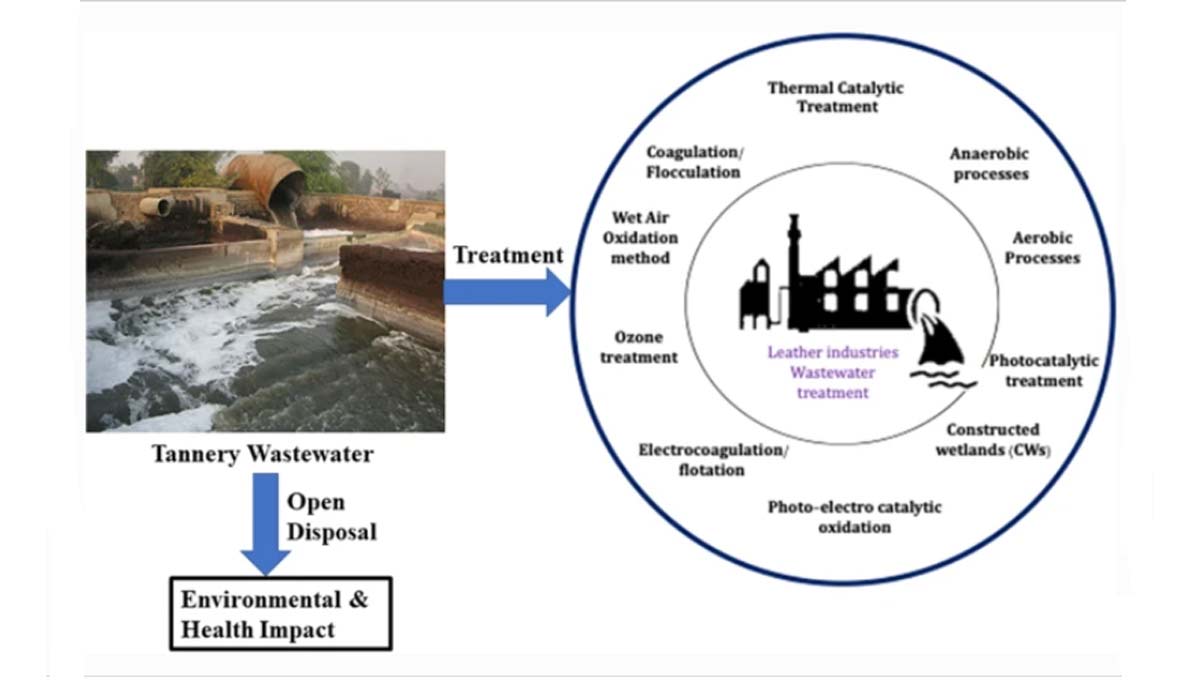
The leather-making process necessitates large amounts of water and consequently generates tons of liquid waste as leather tannery wastewater (TWW) is disposed of directly in the open environment. Open disposal of untreated TWW into the natural environment causes an accumulation of various polluting compounds, including heavy metals, dyes, suspended solids inorganic matter, biocides, oils, tannins, and other toxic chemicals. It thus poses potential hazards to the environment and human health. This study primarily focuses on providing in-depth insight into the characteristics, treatment strategies, and regulatory frameworks for managing TWW in leather processing industries. Different technologies of conventional physico-chemical (equalization, coagulation, and adsorption), advanced approaches (Fenton oxidation, ozonation, cavitation), thermo-catalytic and biological treatments available to treat TWW, and their integrative approaches were also highlighted. This review also sheds light on the most frequently applied technologies to reduce contaminant load from TWW though there are several limitations associated with it such as being ineffective for large quantities of TWW, waste generation during treatment, and high operational and maintenance (O&M) costs. It is concluded that the sustainable alternatives applied in the current TWW technologies can minimize O&M costs and recirculate the treated water in the environment. The exhaustive observations and recommendations presented in this article are helpful in the industry to manage TWW and recirculate the water in a sustainable manner.

